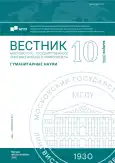The Antientropic Nature of Metatextual Signs
- Authors: Sidorenko V.A.1, Vetrov N.M.2
-
Affiliations:
- St. Luka Lugansk State Medical University
- M. Matusovsky Lugansk State Academy of Culture and Arts
- Issue: No 10(904) (2025)
- Pages: 149-155
- Section: Cultural studies
- URL: https://journal-vniispk.ru/2542-2197/article/view/352423
- ID: 352423
Cite item
Full Text
Abstract
The purpose of the article is to identify the role of metatext in the construction of cultural space. Methodologically, the study is based on historical, comparativistic, logical and analytical principles of studying the relationship between text, reality and human thinking. The object of study is the entropy of culture as a complex system, implying a high degree of heterogeneity and multidirectionality of semantic movement vectors. The conclusions drawn describe metatext as a complex of second-order signs that organize the development of culture and ensure its continuity both at the local and global levels. The main functions of metatext are to reduce the interpretative variability of the text and to link it to an existing corpus.
About the authors
Vladimir Aleksandrovich Sidorenko
St. Luka Lugansk State Medical University
Author for correspondence.
Email: vls.80@mail.ru
Doctor of Philosophy (Dr. habil.), Associate Professor at the Philosophy, Law, Social Sciences and Humanities Department
Russian FederationNikita Mikhailovich Vetrov
M. Matusovsky Lugansk State Academy of Culture and Arts
Email: elvientos@yandex.ru
PhD student at the Cultural Studies Department
Russian FederationReferences
- Demenok, S. L. (2019). Prosto entropiya = Just entropy. St. Petersburg: Strata. (In Russ.)
- Derrida, J. (1998). Of grammatology. The Johns Hopkins University Press.
- Drobyshevskaya, T. L. (2016). Dramaturgiya goroda = Drama of the city. Ekaterinburg: Publishing Solutions. (In Russ.)
- Lugachev, M. I. et al. (2016). Ekonomicheskaya informatika = Economic Informatics. Moscow: Prospekt. (In Russ.)
- Zlochevskaya, A. V. (2022). Tri lika misticheskoj metaprozy XX veka: German Gesse – Vladimir Nabokov – Mihail Bulgakov = Three faces of mystical metaprose of the twentieth century: Hermann Hesse – Vladimir Nabokov – Mikhail Bulgakov. St. Petersburg: Super Publishing House. (In Russ.)
- Stepanyan, K. A. (2016). Shekspir, Bahtin i Dostoevskij: geroi i avtory v bol’shom vremeni = Shakespeare, Bakhtin and Dostoevsky: heroes and authors in big time. Moscow: Languages of Slavic culture. (In Russ.)
- Shadrin, A. A. (2009). Germenevtika smysla social’no-filosofskoj diskursivnosti = Hermeneutics of the meaning of socio-philosophical discursivity. Izhevsk: Udmurt University Publishing House. (In Russ.)
- Ferringer, M. (2019). Avangard i psihotekhnika: nauka, iskusstvo i metodiki eksperimentov v poslerevolyucionnoj Rossii = Avant-garde and Sciences: science, art, and methodology of experiments in post-revolutionary Russia. Moscow: New Literary Review. (In Russ.)
- Barthes, R. (1989). Izbrannye raboty: semiotika, poetika = Selected works: semiotics, poetics. Moscow: Progress. (In Russ.)
- Rondarev, A. V. (2020). Epoha raspada. Grandioznaya istoriya muzyki v XX veke = The age of decay. The great history of music in the twentieth century. Moscow: RIPOL Classic. (In Russ.)
- Kurlov, A. B., Petrov, V. K. (2014). Metodologiya informacionnoj analitiki = Methodology of information analytics. Moscow: Prospekt. (In Russ.)
- Galperin, I. R. (1981). Tekst kak ob’ekt lingvisticheskogo issledovaniya = Text as an object of linguistic research. Moscow: Nauka. (In Russ.)
- Boss, P. (2024). Lyubit’ cheloveka s demenciej = Loving a person with dementia. Moscow: Eksmo. (In Russ.)
- Stinson, C. K. (2009). Structured Group Reminiscence: An Intervention for Older Adults. The Journal of Continuing Education in Nursing, 40(11), 521–528.
- Gadamer, H.-G. (1988). Istina i metod. Osnovy filosofskoj germenevtiki = Truth and method. Fundamentals of philosophical hermeneutics. Moscow: Progress. (In Russ.)
- Schleiermacher, F. (2004). Germenevtika = Hermeneutics. St. Petersburg: European House. (In Russ.)
Supplementary files










